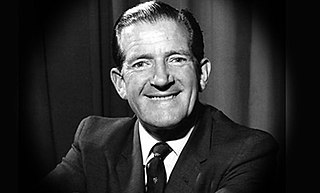
Ted Ray was an English comedian of the 1940s, 1950s and 1960s, on radio and television. His BBC radio show Ray's a Laugh ran for 12 years.
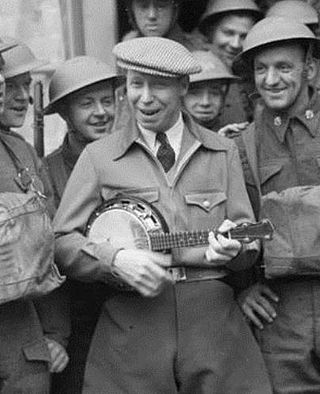
George Formby,, was an English actor, singer-songwriter and comedian who became known to a worldwide audience through his films of the 1930s and 1940s. On stage, screen and record he sang light, comic songs, usually playing the ukulele or banjolele, and became the UK's highest-paid entertainer.

Mark Williams is an English actor, comedian, presenter and screenwriter. He first achieved widespread recognition as one of the central performers in the popular BBC sketch show The Fast Show. His film roles include Horace in 101 Dalmatians (1996) and Arthur Weasley in seven of the Harry Potter films. He appeared in Doctor Who and Red Dwarf. Since 2013, Williams has portrayed the title character in the long-running BBC series loosely based on the Father Brown short stories by G. K. Chesterton.

Robert Wilton Smith, better known as Robb Wilton, was an English comedian and actor. He was best known for his filmed monologues during the 1930s and 1940s, in which he played incompetent authority figures. His trademark was to put his hand over part of his face at the punchline.
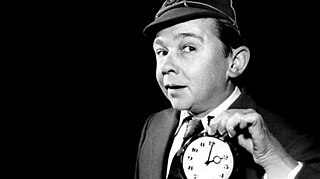
James Robinson Clitheroe was an English comic entertainer. He is best remembered for his long-running BBC Radio programme, The Clitheroe Kid (1956–72).
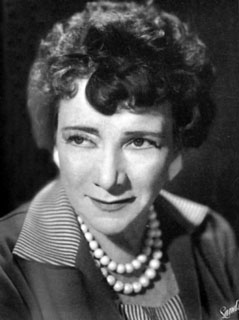
Hylda Baker was an English comedian, actress and music hall performer. Born and brought up in Farnworth, Lancashire, she is perhaps best remembered for her role as Nellie Pledge in the Granada ITV sitcom Nearest and Dearest (1968–1973) and for her role in the 1960 film Saturday Night and Sunday Morning.
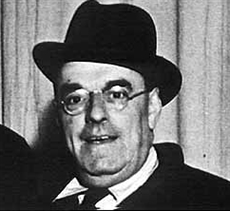
John E. Blakeley was a British film producer, director and screenwriter, the founder of Mancunian Films.

Mancunian Films was a British film production company first organised in 1933. From 1947 it was based in Rusholme, a suburb of Manchester, and produced a number of comedy films, mostly aimed at audiences in the North of England.
Arthur McEvoy Delaney was an English painter whose scenes of Manchester life were influenced by those of L. S. Lowry, gaining some popularity since his death.
Ted Lune was a British actor, best known for portraying Private Len Bone in the TV series The Army Game. He also worked in radio comedy and appeared in a couple of films.

Carleton Crematorium, together with the adjacent necropolis, Carleton Cemetery, is a graveyard located within the Greenlands ward of Blackpool, with its main entrance on Stocks Road in Carleton, Lancashire, England. It was opened on 18 July 1935.

It's a Grand Life, also known as As You Were, is a 1953 British film described in its opening titles as a comedy burlesque. It was directed by John E. Blakeley and stars Frank Randle and Diana Dors.

Holidays with Pay is a 1948 British second feature ('B') comedy film directed by John E. Blakeley and starring Frank Randle, Tessie O'Shea and Dan Young. It was written by Randle, Blakeley, Mavis Compston and Harry Jackson. The film follows the Rogers family as they go on holiday to Blackpool and enjoy a series of adventures.
Somewhere in England is a 1940 British comedy film directed by John E. Blakeley and starring Frank Randle, Harry Korris and Winki Turner. It follows the adventures of an anti-authoritarian private stationed in a military camp in the North of England during the Second World War. It was the first in the Somewhere film series, followed by its sequel Somewhere in Camp in 1942.
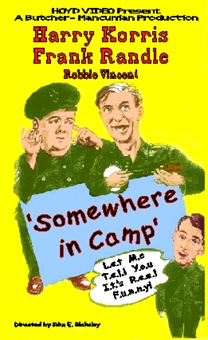
Somewhere in Camp is a 1942 British comedy film directed by John E. Blakeley and starring Frank Randle, Harry Korris and Robbie Vincent. The film continues the adventures of Private Randle from the 1940 film Somewhere in England. It was followed in 1943 by Somewhere on Leave.

Somewhere on Leave is a 1943 British comedy film directed by John E. Blakeley and starring Frank Randle, Harry Korris and Dan Young. It was written by Roney Parsons and Anthony Toner and was the third in the series of Somewhere films following Private Randle and his comrades. It was followed by Somewhere in Civvies (1943).

Somewhere in Civvies is a 1943 British comedy film directed by Maclean Rogers and starring Frank Randle, George Doonan and Suzette Tarri. Private Randle is discharged from the army and finds it difficult to adjust to civilian life. It was followed in 1948 by Somewhere in Politics.

Somewhere in Politics is a 1948 British comedy film directed and produced by John E. Blakeley and starring Frank Randle, Tessie O'Shea and Josef Locke. It was written by Harry Jackson.

Harry Korris was a Manx-British comedian and actor. He was a star of the hit BBC radio show Happidrome, and of the 1943 film version. He also appeared in several Frank Randle films.
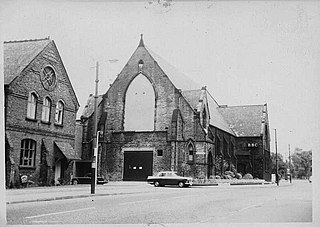
Dickenson Road Studios was a film and television studio in Rusholme, Manchester, in north-west England. It was originally set up in 1947 in a former Wesleyan Methodist Chapel by the film production company Mancunian Films and was acquired by BBC Television in 1954. The studio was used for early editions of the music chart show Top of the Pops between 1964 and 1966.


















